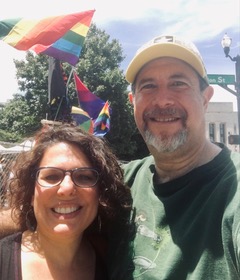By Pamela Goldfinger, June 11, 2021
My name is Pamela Goldfinger, my pronouns are she /her, and my husband Michael and I are Temple Sinai members. We are a blended family with 4 adult kids, one of whom is queer, a son-in-law, a fiancé, extended family and friends, but no pets.
Mike’s been a Temple Sinai member for a long time. Jamie and Kevin, my kids from another mother, received their Jewish educations and celebrated their B’nai Mitzvot here. Prior to meeting Mike I had been actively involved in synagogue life, but it wasn’t until I joined the social justice committee that I really felt like a member of temple Sinai. I needed to make a commitment, to have skin in the game, to feel like part of the community.
Five years ago, I was in DC with Mike and our son Ari, for our daughter Eliana’s graduation. It was Pride Month, and we were walking through a street decorated with rainbows and balloons, and festively dressed members of the Queer community, some of whom were actively protesting the discrimination against queer people. I made some comment about being an Ally. I even wore the Ally pin that I’m wearing today. Then Ari, who had come out as Queer just a few years before, explained to me that being an Ally was more than just loving someone who is gay, and identifying myself as such. Ally is not a label for a status achieved, it is a description of someone who is actively working towards justice. He was kind; not challenging. He was teaching me something important.
So, how does one become part of the Ally community?
An Ally recognizes their privilege and uses it for good: Queer people face discrimination in all walks of life. We have to acknowledge unjust advantage and work toward systemic change. For instance, in our synagogue most of us take for granted the ease with which we dress for services, which bathroom to use, and not having to explain our pronouns when introducing ourselves to new congregants.
An Ally asks educated questions, and does their own research: Sure, the vocabulary may be un-familiar and the learning curve has been steep these past few years. But we don’t ask others to teach us a new language or skill; we have to take on the studying ourselves. Do some reading, some online research, then ask respectful educated questions and check your gut to ensure they’re not offensive or harmful. Shift the burden off of the vulnerable people in your life who may be exhausted from being regularly asked to educate.
An Ally gets comfortable with being uncomfortable: We’re going to make lots of mistakes. Like I said, it’s a learning curve.
An Ally puts their $ where their mouth is: Don’t just talk the talk. Invest your time and money in real life scenarios. Support Queer owned businesses, speak up against bias, challenge gendered and hetero-normative assumptions surrounding life events like weddings, b’nai mitzvot and summer camp. I recently added my pronouns to my Zoom name in the hopes of making it easier for queer people to specify theirs as well.
An Ally speaks up for the marginalized: When we hear something that’s damaging to the Queer community it’s an opportunity to engage in conversation. An Ally takes advantage of the teachable moments, for example, speaking up when someone is misgendered or someone uses insensitive language.
An Ally follows the lead of the Queer community: People should have influence over decisions proportionate to how they’re effected by them. An Ally’s role is to support and use their influence to further the goals identified by queer people. That’s what my goal has been in participating in the social justice committee and organizing Pride shabbat.
So, what does this mean for our Temple Sinai Community?
A 2021 Gallup study said that 5.6 percent of the US population identifies as LGBTQ+, but the real numbers are likely higher. That means that if we don’t recognize our Queer neighbors, relatives, friends or family members in our Synagogue community they are likely not feeling welcome, or relating to what we are offering, or they are going elsewhere else.
How can we at Temple Sinai become a more welcoming and relevant space? We commit ourselves to the enforcement of diversity, equity, and inclusion, developing strategies and best practices that encourage racial, social, sexual and gender diversity.
This is going to be a long process. Personally, I’m still working at it. Five years ago I didn’t really know what it meant to be an Ally, three months ago I wasn’t familiar with diversity, equity and inclusion, and prior to this year, Temple Sinai hadn’t ever had a Pride Shabbat. There is a lot to being an Ally, but there’s so much information out there, and there’s so much to be gained both for our Queer loved ones, and for ourselves.
Shabbat shalom, and Happy Pride Month.
Read the other blog posts in this series:
- What Pride Means to Me: A Reflection
- How the Rabbinate Helped Me Come Out
- Celebrating Pride in a World So Far from Whole
|
|
Pamela Goldfinger (she/her) is a social worker, spouse of Dr. Michael Goldfinger, mother/stepmother of four wonderful adults, one of whom is queer. Pamela was a participant in Don’t Kvech, Organize!, a Join for Justice program. These remarks were shared with her synagogue, Temple Sinai in Dresher, PA, on 6/4/21 on the occasion of their first Pride Shabbat. |

